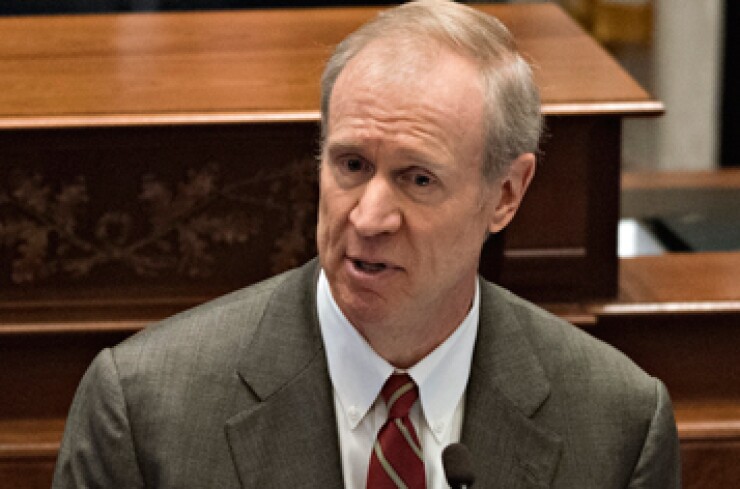CHICAGO – Chicago Public Schools is banking on $300 million in new state aid as it prepares a fiscal 2018 budget, funds at the center of a dispute between Gov. Bruce Rauner and Democratic leaders that threatens the distribution of aid to all districts.
The Chicago district will distribute local budgets to principals on Thursday and “in the next few weeks” will release a budget for the fiscal year that began July 1 to meet a late summer deadline for passage, said CPS spokeswoman Emily Bittner.
The district relied on hundreds of millions of additional state help over the last two years that didn’t come through, driving a cash crunch.
The district says it’s counting on the funds because they are incorporated in Senate Bill 1, which has passed both chambers. The bill overhauls the distribution of kindergarten through 12th grade aid based on an “evidence-based” model aimed at providing more help for districts without wealthier tax bases.
Democrats required that distribution of all school district operating aid in the $36.1 billion fiscal 2018 budget they pushed through over Rauner's veto be based on such a formula, so all fiscal 2018 funding is blocked unless SB1 or some other bill that uses a similar formula is adopted.
On Monday, Rauner demanded that the Senate’s Democratic leadership send SB1 to his desk so he can use his amendatory veto to reshape it, cutting CPS’ additional $300 million of aid by about $145 million and distributing it through the system.

“We have a chance to make history and adopt a new school funding plan that, for the first time, ensures all school districts in Illinois are equitably and adequately funded,” Rauner said in statement. “Unfortunately, Democrats want to turn this historic opportunity into a bailout for the CPS pension system.”
“Governor Rauner’s stunt won’t pass legal muster, and instead jeopardizes the opening for dozens of school districts around the state. Chicago Public Schools will open on time,” CPS spokeswoman Emily Bittner said in a statement.
CPS argues that the courts have found amendatory vetoes cannot either change the “fundamental purpose/intent of the legislation” or make “substantial or expansive” changes to it.
CPS contends a fundamental point of the legislation is to put the district on more equitable ground with other districts on pension funding as well as aid levels. The state pays $4.6 billion toward teachers’ pension on behalf of other districts while CPS pays nearly all of its more than $700 million contribution. Rauner allows for pension aid but cuts CPS block grants.
John Patterson, a spokesman for Senate President John Cullerton, D-Chicago, said the timing of sending the bill to Rauner had not been decided nor what action might lie ahead given Rauner’s pledge to immediately use his amendatory veto powers.
“We’ll need to see if he does this and then how he does it to be able to answer that,” Patterson said.
The first state aid payment is due Aug. 10 and some school districts have voiced concerns over their ability to go long without aid. Some have said they might not open schools or be able to keep them open for long. Wealthier districts have said reserves will help them weather any delays, while some can issue short term tax warrants to manage.
A group of Lake County school districts called on Rauner Monday to sign SB1.
“Our schools in Round Lake and across the state, from the suburbs to downstate, need certainty and stability regarding funding and opening our doors on time,” said Constance Collins, superintendent of Round Lake Area School District 116. “SB1 is the only bill that provides us that certainty."
Kroll Bond Rating Agency said in a report last week about Chicago Public Schools that it “remains deeply concerned about the board’s prospects for passing a balanced FY 2018 operating budget and its ongoing thin liquidity position, which relies heavily on external borrowing. In KBRA’s view, it is increasingly critical to identify and implement a meaningful long-term funding solution that would alleviate the structural imbalance in the Board’s operating budget.“





